Maritime
Nigeria Customs’ to generate N300bn from car marts’ invasion , says Analysts
Published
6 years agoon
By
Olu Emmanuel
Analysts have estimated that the Nigeria Customs Service (NCS) could generate over N300 billion as duties on imported vehicles from sealed automobile marts in Abuja, Kano, Lagos and seven other cities as well other dealerships who have been directed to regularise their operational documents in a new offensive against vehicle smuggling and evasion of duty on vehicle by importers.
The NCS recently launched an offensive against vehicle dealers in Abuja, Lagos, Kano and other selected cities, sealing up 110 automobile shops and directing all automobile shops in the country to perfect their operational documents or cease to exist.
An obvious need to generate more government income seen recently in the Muhammadu Buhari administration, which planned a raise in VAT by 2020 and a possible return of tollgates on highways, appeared to have informed the offensive launched by the Customs against the vehicle market.
President Buhari had also recently warned about dire consequences against direct revenue units who do not pull in the cash from their activities and fall short of their targets; and it would seem the Customs would not be caught napping in this regard.
The comptroller-general of Nigeria Customs Service Hameed Ali said nearly half of the vehicles imported into Nigeria are smuggled in. He has therefore, ordered a holistic audit all vehicles, especially high-end cars and sport utility vehicles at all automobile shops to determine if their full tariffs were paid.
Maritime analyst while speaking on Maritime half hour on NTA monitored by National Daily said that the trade agency could rake into the federal government coffers, at least N300 billion being duties collected from defaulting vehicles in the ongoing onslaught against vehicle smuggling. He said thousands of vehicles were affected, with “an alarming number of high-end vehicles,” which are expected to drive up the expected revenue.
Quoting the National Bureau of Statistics, James Udeh, a shipping analyst said with Nigerians spending $8 billion (about N2.8 trillion) on vehicles in a year, duties and levies on the vehicles at a minimum of 35 percent amounted to N980 billion in a year.
“As the controller-general of Customs has said, nearly half of imported vehicles are smuggled into the country. If this is true, it could mean that nearly half of about N980 billion, which is N490 billion could be hanging on those vehicles smuggled into the country. So, we can safely estimate that if this is an action the Customs want to be consistent on, the agency could earn between N300 billion and N400 billion from tariffs on those vehicles,” he said.
“The revenue figures for smuggled cars will not be easy to determine, because there are many types and models of vehicle and Customs clearing rates for each of them are determined differently. But going by vehicle importation figures and the rate of clearing a vehicle from the Customs, it is possible to rake in that much from smuggled vehicles, if they can recover up to 70 or 80 percent of them. Actually more than half of the vehicles that are imported into Nigeria come through the neighbouring port of Cotonou and most of them are smuggled into Nigeria through land,” said Taiwo Adekanju, an automobile dealer.
The NBS in 2018 released its report tagged, “Nigerian Ports Statistics, 2012 to 2017,” where it stated that vehicles imported into Nigeria through, Apapa, Tin Can and Onne ports, showed that the Nigerian economy received a total of 1,216,131 used and new vehicles that were imported into the country between 2012 to 2017, showing an average annual import of 202,688 vehicles. Although the National Bureau of Statistics did not put a value to the vehicles, estimates showed that Nigeria spends over $8 billion annually on vehicle importation.
Vice President Yemi Osinbajo corroborated the facts at the 19th Abuja Motor Fair when he said that Nigerians spend about $8 billion annually to import vehicles into the country.
It was gathered that duty paid on a Honda Accord 2008 is N570,000. The rate is also applicable to Hyundai Accent 2008, Kia Fort 2008, Mazda 3 2008, and Nissan.
Lexus ES 350 is levied at N670,000, while Toyota Camry 2009 is as high as N795,000. Customs duties and levies are calculated on the basis of Cost, Insurance and Freight (CIF), meaning that the cost of insurance and shipping are also embedded in the 35 per cent duty for Tokunbo vehicles and 70 per cent tariffs on new vehicles.
“Although I cannot give the exact number of vehicles and exotic cars whose duties were not even paid found in those sealed shops, the NCS stands to generate a huge amount of revenue coming from them. What we have discovered is that for a huge number of these vehicles coming into Nigeria, duties were not fully paid.
From all of the vehicles whose duties were either half paid or not paid at all, the NCS should expect at least, N300 billion. Various amounts are paid as duties for various types and models of vehicles. For the new vehicles, tariff of 70 percent is paid and this includes 35 percent duty and 35 percent levy. But for used vehicles, Customs collects only 35 percent duty.
In a renewed anti-smuggling campaign aimed at ensuring compliance with import guidelines, operatives of the Federal Operations Unit, Zone B in conjunction with the Strike Force of Nigeria Customs Service recently sealed about 110 car shops in Abuja, Kaduna, Kano, Ilorin, Sokoto, Kebbi and other cities in the North.
Mstafa Sarkin-Kebbi, Controller of the unit said the clamp down on the car shops is in exercise of the extant laws empowering customs operatives to enter any building suspected to have smuggled items.
Sarkin-Kebbi said the controller-general of Customs has approved that owners of vehicles found to be without proof of duty payment can come forward to pay and collect their vehicles
He disclosed further that his men are applying tact, intelligence and cooperation in the fight against smuggling as according to him, smugglers are planting informants around Customs operatives to compromise and circumvent their anti-smuggling duties
He said, “The controller-general, Col. Hameed Ali , has graciously approved that owners of vehicles that have not paid duty and are affected by our raids, can come forward to pay and collect their vehicles. This is a window of opportunity for owners of smuggled vehicles to come forward and pay Customs duty to avoid forfeiture. Duty evasion which robs government of revenue will not be condoned under our watch because our Controller General has declared zero tolerance to such unlawful act.
Meanwhile, Hameed Ali has directed that owners of vehicles seized or detained will pay the complete duty with 25 percent penalty levy.
In a circular released by AOB Fatade, assistant comptroller-general, all operations units were mandated to report action on this to the headquarters on a weekly basis.
It stated, “The Comptroller-General of Customs has directed that henceforth, all vehicles detained or subject to detention should be allowed to pay the correct and complete Customs duty with the 25 percent penalty levy.
“Furthermore, you are directed to note that all vehicles seized and taken into Customs custody (condemned by a competent court of jurisdiction in accordance with the provision of Section 167 of CEMA Cap C45 LFN 2004)shall not enjoy the above privilege consented in paragraph 1.
“Consequently, it shall attract the penalty prescribed in Section 167 referred thereto.”
“Section 167 of the Customs and Exercise Management act states that: Any officer or police officer, or any other person authorised in that behalf by the Board, may at any time seize or detain anything liable to forfeiture under the customs and excise laws or which such officer, police officer or other person has reasonable grounds to believe are liable to forfeiture thereunder.
“Anything seized or detained under the customs and excise laws shall forthwith be delivered into the care of the Board and, subject to the provisions of the Third Schedule to this Act, shall, pending the determination as to its forfeiture or disposal, be dealt with, and, if condemned or deemed to have been condemned as forfeited, shall be disposed of, in such manner as the Board may direct.”
You may like
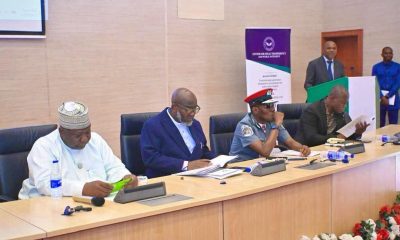

NCS Reaffirms Commitment
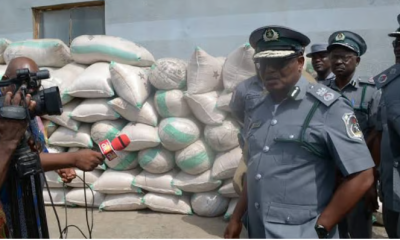

Zero-import duty: Customs to lose N188 billion revenue
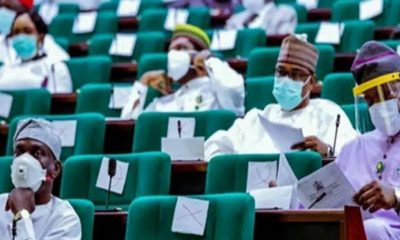

Major revenue from Customs comes from South West — Reps


COVID-19: Customs to deploy cameras for cargo examination


Apapa Customs Command generates N39.8bn in April
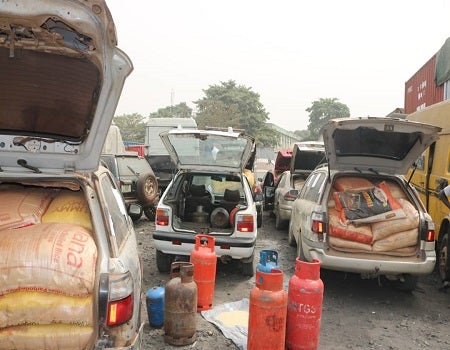

Customs seizes 140 smuggled gas cylinders, 678 fertiliser bags in Katsina
Trending

 Health6 days ago
Health6 days agoDeclassified CIA memo explored concealing mind-control drugs in vaccines

 Crime7 days ago
Crime7 days agoSenior police officers faces retirement after Disu’s appointment as acting IGP

 Comments and Issues1 week ago
Comments and Issues1 week ago20 Critical Fixes to Save Nigeria’s Democracy from Electoral Fraud

 Latest1 week ago
Latest1 week agoICPC yet to respond to El-Rufai’s bail request as arraignment date looms

 Comments and Issues1 week ago
Comments and Issues1 week agoGovernance Before Guns: Why Institutional Coherence Determines Security Outcomes

 Football1 week ago
Football1 week agoMartínez ruled out of Everton clash with calf injury

 Comments and Issues1 week ago
Comments and Issues1 week agoWho owns Abacha’s loot? Nigeria and the fight for the people’s money
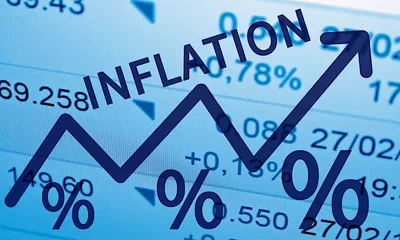
 Comments and Issues1 week ago
Comments and Issues1 week agoShooting down inflation and rising poverty

